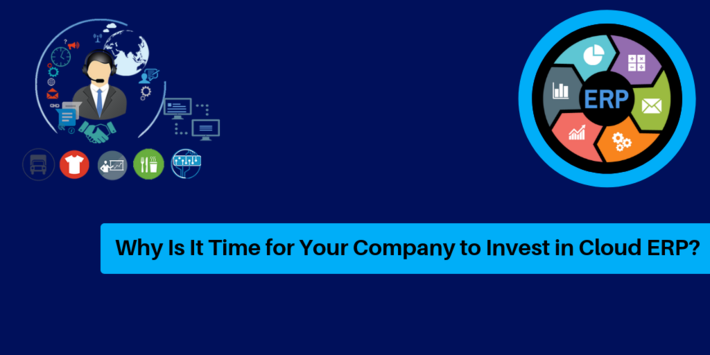
Businesses need to effectively manage and plan their day-to-day activities, business strategies and future planning. To efficiently collect and manage all such information, Enterprise Resource Planning (ERP) has become crucial to all kinds of businesses.
ERP slowly became a part of businesses from the 1990s and now it has expanded to every small business and major corporation in the world. ERP is indispensable to manage thousands and thousands of data regarding accounting, customers, procurement, etc. ERP is a central system that holds the major details of the business operations together. It can help in automating transactions, avoid duplicate records and maintain proper flow of movement over the business.
Cloud ERP – The Present and Future of Efficient Business Operations
Nowadays, having only the transactions of the business operations on a single database isn’t sufficient enough. Businesses need to bring every single action of the company from a single point of access like Customer Relationship Management (CRM), Supply Chain Management (SCM), Enterprise Performance Management (EPM) and Human Capital Management (HCM). To bring all these different databases together, a cloud platform is necessary.
Imagine having a Microsoft dynamics 365 on-premise ERP system. Any new systems that the company may need will be provided by individually run software that doesn’t have any connection with each other. Soon enough, the company will have a lot of different databases and software running on its own disjointedly that results in complete lack of collaboration between the departments.
A lot of businesses are still relying on the on-premise ERP system battling with business flow issues every single day. According to research, around 60% of business with one ERP system in place still use on the on-premise version. How efficient would it be if these businesses can save themselves the trouble of using individual systems for different applications and instead let the ERP sync with other systems?
Cloud ERP eliminates all complex coordination problems in a company all bring all the business activities under single access. The data entered through the ERP will be synced across the other platforms avoiding data duplication or loss.
The High Time When You Need Cloud ERP
Cloud ERP helps in maintaining the flow properly across all systems helping the employees from any headaches regarding the coordinated activities.
Still wondering the need to update to cloud ERP? Here are a few reasons why you need to make the shift now.
Your Business is Anything but Agile
Agility has become the mantra for any business operation but if your company lacks agility, then it probably is losing all of the productive hours in doing mundane tasks. Cloud ERP helps a business become agile eliminating all the clutter of confusions and help the employees focus on the real task at hand. The information added in the cloud ERP is available on the server which can be accessed from any device, any time one wants with just a good internet connection.
Microsoft Dynamics 365 is one such service which brings together ERP, CRM and other business operations in a single cloud platform helping the employees to work from a single place.
Your Clients Are Complaining
You may miss to send out the products to the clients in the time promised. You may have skipped making payments to the vendor before the deadline. You may have run out of stock at the exact same time you had to deliver.
All of these problems are due to the lack of coordination between the departments which is exactly due to the absence of integration between systems. When the business operations and the customer management along with the supply chain and procurement are accessed under the same roof, it can bring all these issues to a stop and help the employees focus on more things important. Dynamics 365 offers integrated cross-platform functions which help in providing better customer experience.
You struggle to Make Informed Decisions
Well, you have got the data you want in the ERP but ERP isn’t just about collecting data and maintaining records. Instead of letting the collected data go futile, businesses can actually use it for analysis and improvements.
The business intelligence of a company depends majorly on how efficiently they make use of the resources at hand. An integrated cloud ERP system can bring together data from multiple platforms and analyse, helping to identify the competent areas and improve business performance.
The ERP dashboard in Microsoft dynamics cloud services can seamlessly integrate and bring all the required data together to make important business decisions. It facilitates this analysis, creates graphs and builds up reports reducing the time spent on business planning and help in reaching data-supported decisions.
You Worry A Lot About Data Security
When you have your own on-premise ERP, it involves a lot of security measures enabled by the IT persons. The security of the ERP is as good as the IT department you hired.
In cloud ERP, all the security measures are monitored by the providers who have stronger security encryptions and effective authentication in place. Cybersecurity is centralized and doesn’t leave any space for security vulnerabilities.
Microsoft has pulled at all stops to make Dynamics 365 the safest platform to store and work with data. The work of the IT department will also be cut down as Microsoft will become responsible for your data security.
